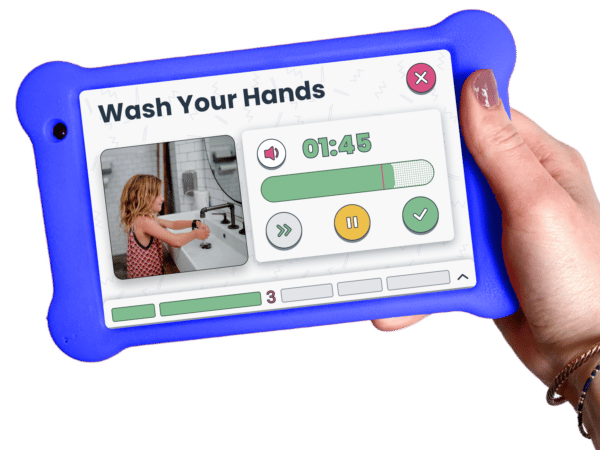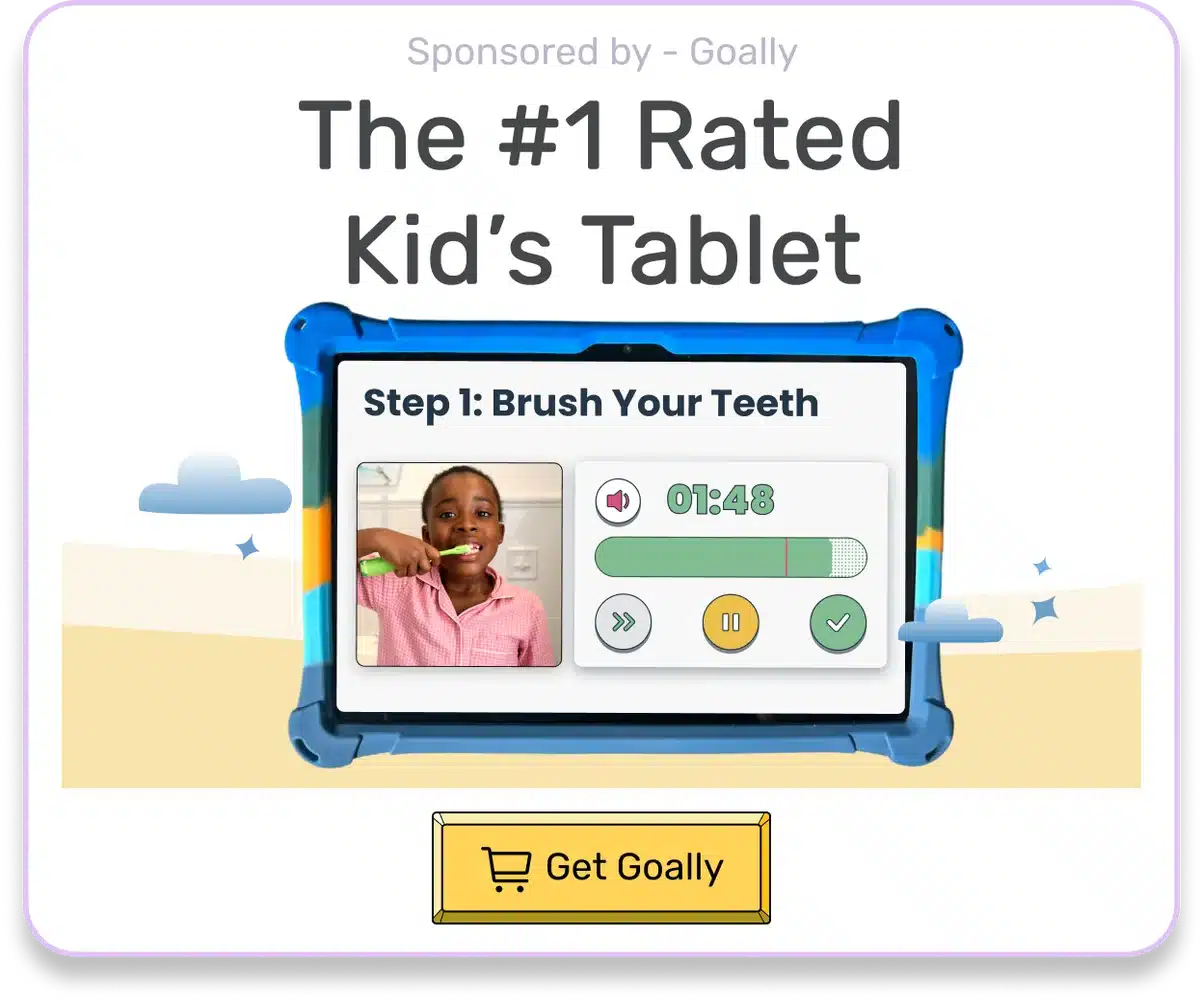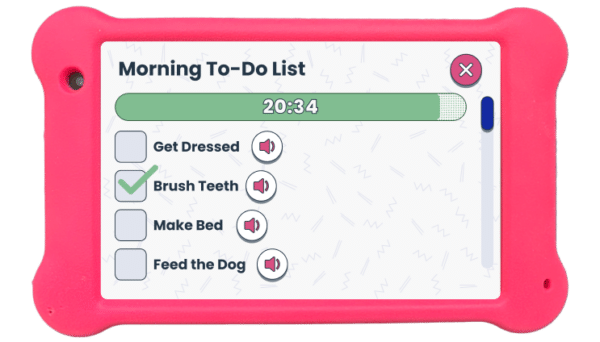Neurodivergent kids are bright and capable, but certain concepts may be harder for them to wrap their heads around. Unfortunately, some of those things, like a child calendar, are the same things that can help them function at their full potential! Many kids with special needs struggle to understand the calendar. Some have a hard time grasping it as a whole, while others understand the basic concept of a calendar, but aren’t yet capable of using a calendar to help them.
Table of Contents
Why Does a Child Benefit from a Calendar?
Do you use a calendar? A reminder app in your phone? It just works. So give kids the same tools. Children often struggle with routine. They may understand that they have to do certain things at certain times, but time itself is a vague concept that they struggle to grasp. For neurodivergent children, this problem is even larger.
For example, people with ADHD have a harder time perceiving time than other people. They may find themselves losing time or feeling as though time isn’t “real” or like it has consequences. With a calendar, it’s easier to put time into understandable and digestible chunks. There’s always a visual reminder of what day it is and what needs to be done on that day, so forgetting is far more difficult.

Read more: Skylight Calendar Review | 2023
Calendars are simple versions of planners. While your child might not yet be ready for a complete planner full of daily tasks, a calendar breaks everything down into short and sweet words that they can grasp onto. Children need structure and a calendar is a great way to start establishing that structure.
Motivating Your Child To Use the Calendar
Now that you have a calendar for your child, you may be wondering how to get them to use it regularly. As a parent, you may have experienced that children tend to lose interest in new things pretty quickly. They might even forget about it in a matter of minutes.
Well, don’t worry, you are not alone! It can be challenging to encourage your child to develop a habit of using their calendar regularly. However, here are a few tips that might help you in the process.
Work Together on the Calendar
| Child Calendar Tips |
|---|
| 1. Involve your child: Let your child participate in putting together their calendar, giving them a sense of autonomy and involvement. |
| 2. Encourage input: Allow your child to provide input, such as suggesting playtime or activities, to make the calendar more personalized. |
| 3. Use a physical calendar: Consider using a whiteboard calendar where your child can write dates and tasks using dry-erase markers. Add drawings or magnets for extra creativity and engagement. |
| 4. Incorporate Goally: If you use Goally, let your child add stickers and a special lanyard to their calendar for added fun and motivation. |
| 5. Improve memory: Encouraging your child to write things down on their own may help improve their memory and reinforce their schedule. |

Reward Good Behavior
If you’re looking to motivate your child to use their calendar, incorporating a reward system can work wonders. Children are often responsive to rewards, and offering incentives for checking off tasks or events can help establish a routine.
The rewards you choose don’t have to be extravagant. Consider small but meaningful items like fun stickers or magnets for their physical calendar, their favorite snacks, or even a special item at the end of each month. By offering a monthly larger item, your child may feel even more motivated to track the days of the month on their calendar.
Helping a Child Understand the Calendar
Even a motivated child can still struggle to use their calendar. It might seem confusing to them if they haven’t gotten used to it yet. Here are a few things that you should include on your child’s calendar and how you can help your child understand them.
Read More: Tips for Creating an ASD Calendars
Goally | The Tablet for Neurodiverse Kids

Establishing Routines
Calendars are key when it comes to building routines. When you explain this to your child, and explain how routines are beneficial to them, they may be more inclined to try and understand. Walk your child through the routine that you’re putting on the calendar. Again, ask for their input along the way. For the first few days, help them through this routine so they can solidify it in their mind. Make checking the calendar a part of your child’s morning routine as soon as they wake up.
Using Checklists
Make sure to take advantage of the checklists on your calendar! Checklists are great for breaking down days into easily digestible pieces so children don’t get overwhelmed. A checklist will show the child all of the “parts” of the task when they’re supposed to complete it. For example, “Brush your teeth” may break down into:
- Go into the bathroom
- Rinse your toothbrush
- Add toothpaste
- Brush for 2 minutes
- Spit
- Rinse toothbrush
Breaking things down this way will make them way more understandable for your child.

Creating Daily Reminders
If you’re using Goally, you’re lucky enough to have built-in reminders for your child’s calendar. You can set sound notifications to tell your child when it’s time to do something. Over time, your child will remember to do these things on their own. Those initial reminders provide a great starting point!
Goally | Apps To Structure Your Kid’s Routine
Does your child struggle with transitions or staying on task? Goally’s visual schedule app breaks down large tasks into small, achievable steps. It helps kids complete their tasks independently!
Your Child Will Thrive With a Good Calendar
Once your child knows how to understand the calendar, they’ll have an easier time moving through their days without stress. Even forgetful children thrive when they understand how to keep track of their schedules. Are you looking for a better and easier way to help your child keep track of time? At Goally, we have a solution! Check out our pricing plans or try a free demo today! We know you’ll love it.
FAQs About a Child Calendar
What is a child calendar? A child calendar is a tool that helps children plan and organize their activities, events, and appointments. How can a child calendar benefit special needs children? A child calendar can benefit special needs children by helping them develop routine, structure, and predictability. It can also improve their time management, reduce anxiety, and provide visual support. What features should I look for in a children's calendar for special needs kids? Look for a calendar that is easy to use, has large and clear fonts, color-coding options, and visual cues. You may also want to consider features such as reminders, alarms, and customizable templates. How can I encourage my child to use their calendar? You can encourage your child to use their calendar by making it a fun and interactive activity. You can use stickers, magnets, or other visual aids to help them mark off completed tasks. You can also set up a reward system for using the calendar regularly. Can a calendar help special needs children with executive functioning skills? Yes, a calendar can help special needs kids with executive functioning skills by improving their ability to plan, prioritize, and organize tasks. It can also help them develop skills such as time management, working memory, and self-regulation.
This post was originally published on 02/17/2022. It was updated on 01/16/2024.

Goally
We help parents teach their kids life skills, like doing bedtime and morning independently. Backed by science, we incorporate evidence-based practices and expert-informed designs in all of our apps and content.






